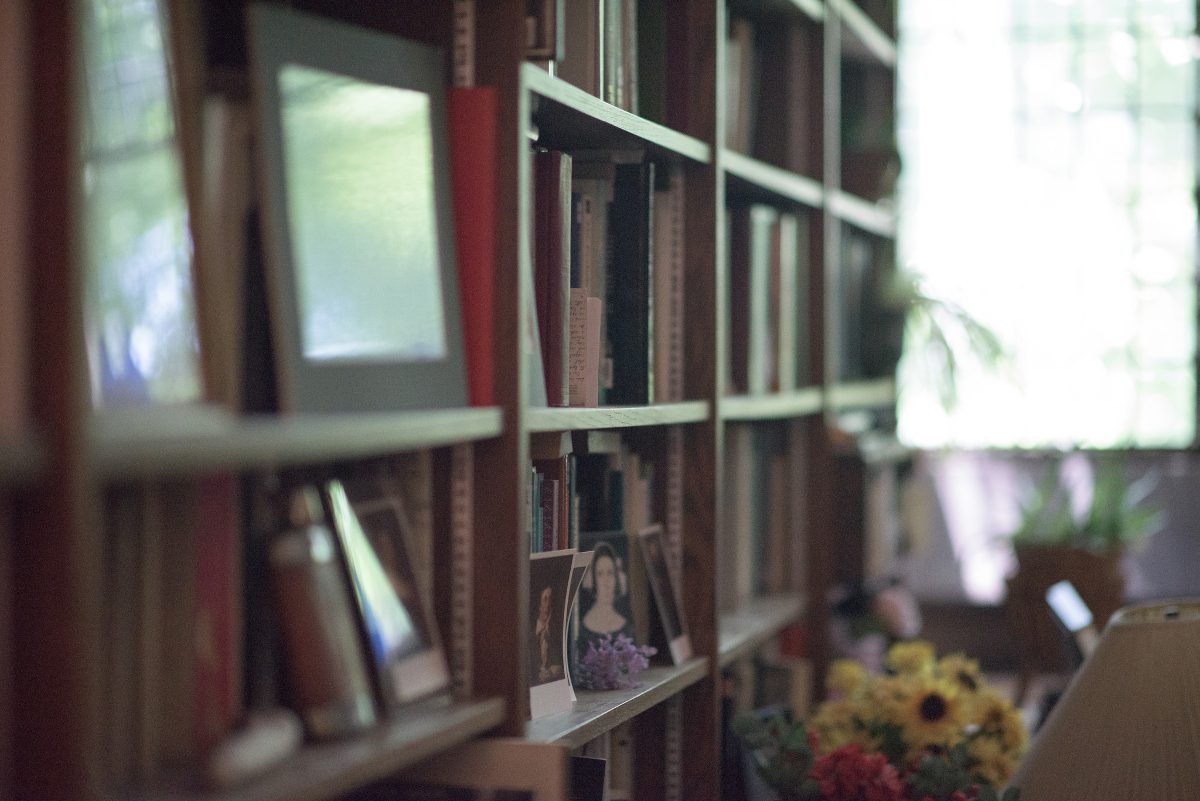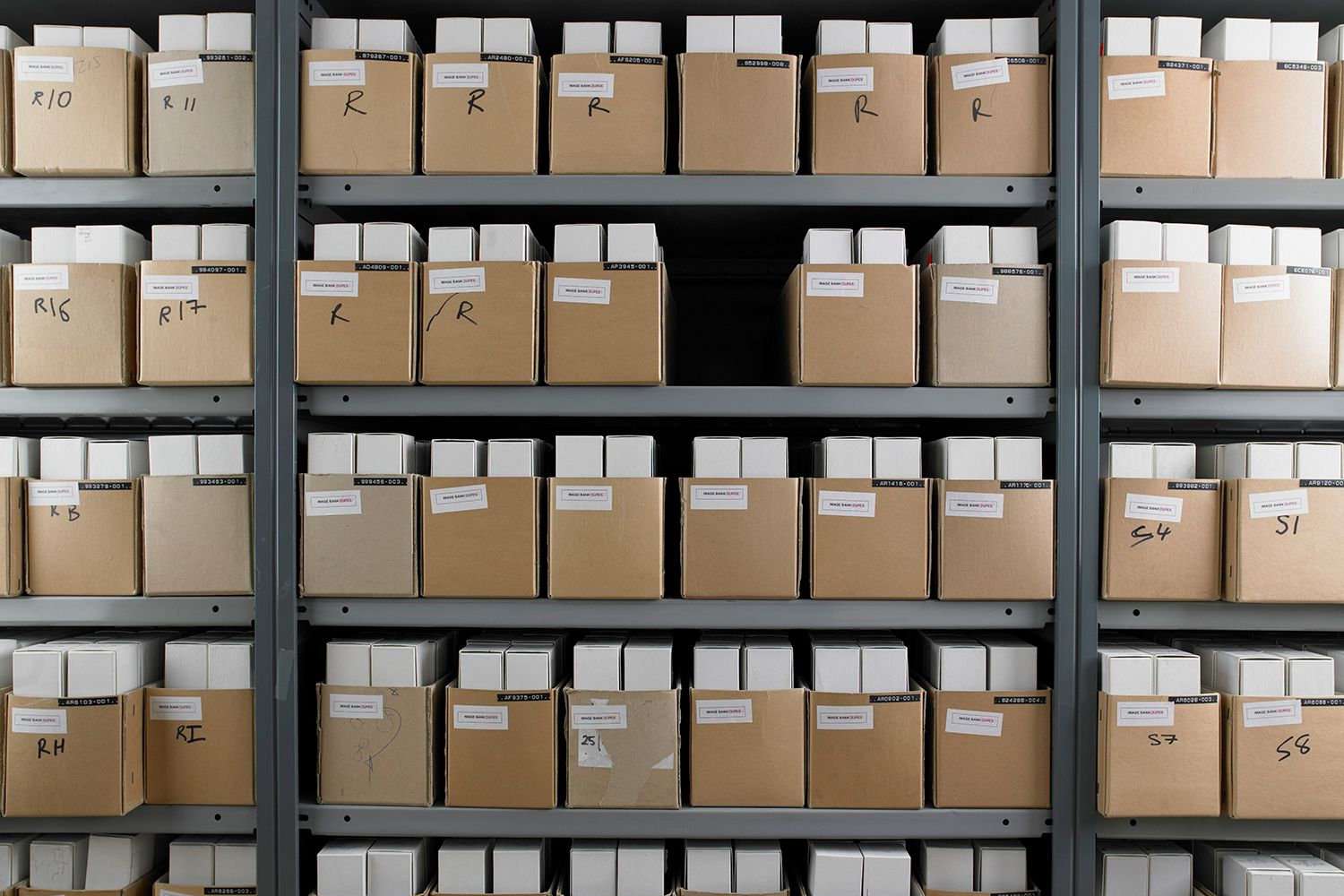The Council supports a range of discussion groups and workshops. Faculty and graduate students who wish to constitute such groups are invited to contact Kathleen Crown, kcrown@princeton.edu, executive director of the Council of the Humanities, with a proposal.
Humanities Council Working Groups
“BODIES OF KNOWLEDGE”
The Humanities Council sponsors the Bodies of Knowledge Working Group whose purpose is to engage faculty, staff, and graduate students in questions around embodiment from a wide range of viewpoints including the medical humanities, disability studies, art history and aesthetics, and environmental studies in the Anthropocene. In particular, the group hopes to foster intellectual partnerships with those within and beyond the humanities who share a critical interest in exploring and expanding the multidisciplinary conversations surrounding bodies, their environs, and their representations. Meetings will be held on select Thursdays from 12:00 PM to 1:30 PM, and, in Fall 2021, via Zoom. If you would like to be included in the list of participants, are interested in presenting your work-in-progress, or have any programming inquiries, please contact Elena Fratto (Slavic Languages and Literatures) at efratto@princeton.edu or Arbel Griner (Princeton School of Public and International Affairs) at agriner@princeton.edu.
Fall 2021
October 7th
The Human Colony: Symbiogenesis and Sympoiesis in the Works of Konstantin Merezhkovskii and Alexander Bogdanov: Mieka Erley (Colgate University)
November 4th
Conflating animal slaughter and animal and human sacrifice: Vasily Rozanov and ritual murder trials: Henrietta Mondry (University of Canterbury, New Zealand)
Spring 2020
February 13th
From Pathology to ‘Born Perfect’: The Role of Scientific Authority in Campaigns to Ban Conversion Therapy: Joanna Wuest (Society of Fellows)
March 5th
Standing in Line: Bodies in a Struggle with Soviet Scarcity: Angela Brintlinger (Ohio State University)
March 12th
Medicalization of Love: Neuroscience, Addiction and New Diagnostic Categories: Arbel Grinel (Princeton Global Health Program)
April 7th (the only one not on a Thursday)
Sacrificial Limbs: Masculinity, Disability, and Political Violence in Turkey: Can Açıksöz (UCLA)
April 23rd
“Zoopsychology in the Service of Socialism”: Service Dog Training and Child Upbringing in Soviet culture, 1930s: Henrietta Mondry (University of Canterbury, New Zealand)
Fall 2019
October 10
Understanding Adaptive Activism: Reframing Disability in Drama and Art: Ann Fox (Davidson College)
November 7
AI and the Medical Humanities: An Emerging Field of Critical Intervention: Kirsten Ostherr (Rice University)
December 5
Queer Affect in Crip Landscapes: Disability, Desire, Devestation: Robert McRuer (George Washington University)
“ARCHIVAL SILENCES”
The Archival Silences Working Group seeks to foster an interdisciplinary conversation centered around the limits, freedoms, frustrations and general complications presented by the many biases inherent in both past and present archival practice. Built on writing by academics, archivists, librarians, community activists and essayists, this group will have two aims: to establish the problem of archival silences and examine ways in which that problem has been reckoned with by various communities. Meetings will be held on Mondays at 4:30 PM to 6:00 PM in Joseph Henry House.
The first meeting will explore Saidiya Hartman’s landmark essay “Venus in Two Acts” (Small Axe 12.2 [2008]) and host a discussion of the concept and method of critical fabulation. For more information and a copy of the reading, please contact Emma Sarconi (Reference Librarian, Special Collections) esarconi@princeton.edu or Kinohi Nishikawa (English; African American Studies) kinohin@princeton.edu. Future readings will be circulated in a shared drive to which all participants will have access.
Spring 2020
February 10
Michelle Caswell: “Dusting for Fingerprints: Introducing Feminist Standpoint Appraisal.”
February 24
Jarrett Drake: “The Urgency and Agency of #OccupyNassau”
Ashley Farmer: “Archiving While Black”
April C. Armstrong: “What Archival Silence Conceals—and Reveals: Recovering Princeton University’s 19th-Century African American Graduate Alumni” (Mudd Manuscript Library Blog)
March 24
Workshop:(In)visibilities, Omissions and Discoveries: Archival Absences in Life Magazine and Beyond
April 6
Andrew Israel Ross: “Sex in the Archives: Homosexuality, Prostitution, and the Archives De La Préfecture De Police De Paris.”
April 28
Lunch discussion led by Kirsten Weld (Harvard). Details to follow.
Fall 2019
October 14
Saidiya Hartman 2006 article: “Venus in Two Acts”
November 4
Rodney G. S. Carter: “Of Things Said and Unsaid: Power, Archival Silences, and Power in Silence”
November 18
Anjali Arondekar: “Without a Trace: Sexuality in the Colonial Archive”
December 2
Lauren F. Klein: “The Image of Absence: Archival Silence, Data Visualization, and James Hemings”
“COMPARATIVE DIPLOMATICS”
A faculty-graduate student working group of the Comparative Antiquities network at the Humanities Council, co-sponsored by the Program in Medieval Studies.
October 2, 4:30-6:00 PM, Scheide Caldwell 203
Marina Rustow (NES, History): “Multi-handed Arabic documents and the Fatimid State”
October 23, 6:00PM – 7:30 PM, Chancellor Green 105
Hiroshi Takayama (IAS, The University of Tokyo)
November 6, 6:00 PM – 7:30 PM, Chancellor Green 105
Khodadad Rezakhani (Research Scholar, Mossavar-Rahmani Center)
December 11, 4:30 – 6:00 PM, Chancellor Green 105
Rachel Mairs (University of Reading): “What can(‘t) Greek documents from Egypt tell us about Greek documents from Bactria?”
“PUBLIC HUMANITIES”
The working group invites University faculty, graduate students, and staff for monthly conversations about our shared humanistic work and its larger, public implications outside of university life, and to consider more largely the value and relevance of the humanities in our present moment. Topics of discussion will include: the public-facing humanities at Princeton; independent research libraries; podcasts; state humanities councils; public humanities programs at peer institutions; and literary and cultural journals. Questions will be asked about funding cuts for the humanities and defining the value of what we do; how might we contextualize this current “crisis of the humanities” within old and not just new pressures? In an Ivy League University that can sometimes feel like a world unto itself, how might we envision the meaning of our work as scholars, writers, thinkers, and teachers, and possibly as future professionals in diverse humanistic fields and institutions? How do we define public humanities? How do various groups and individuals define it – you personally, the university, and the public for example?
Meetings will take place over dinner on Thursday 6:00 – 8:00 PM. For those interested in joining the group, contact Kate Thorpe (English) kthorpe@princeton.edu or Liz John ejohn@princeton.edu.
Spring 2020
February 13, Scheide Caldwell 103
East Coast Corridor Public Outreach
March 5
March 26
April 16
May 14
“HISTORICAL POETICS”
Historical poetics is a way of working through various ideas about poetry: what it is, how to read it, and how these ideas have changed over time. These are theoretical as well as historical questions, especially in the nineteenth century, a period of rapid development of historicisms, prosodic systems, and the global spread of English. The Historical Poetics reading group considers how nineteenth-century Anglophone poetry borrows from, appropriates, or imitates non-English poetry at the same time that such translation and assimilation formed the basis of the academic discipline of English. The 2019-20 year will focus on “Poetry and its Others” as a broad theme. For more information on the reading group, see historicalpoetics.com.
In 2019, the group will meet on October 18 and 23. The group will also attend a Historical Poetics conference at the University of Texas at Austin on November 7 to 10. For those interested in joining the group, please contact Meredith Martin at mm4@princeton.edu.
WORKING GROUPS ACROSS CAMPUS
GLOBAL HISTORY WORKSHOP
The Global History Workshop (GHW) is a lunchtime lecture series that provides a forum for scholars from institutions in the United States and around the world to present their research in the field of global history broadly defined. The Global History Workshop is an integral part of the programming for the Global History Lab, which is housed in the Department of History and is home to a diverse group of faculty and students working in the field of global history. For the 2019-20 academic year, GHW will be coordinated by Robert Konkel and Pablo Pryluka under the direction of Professor Jeremy Adelman. View past events in the GHW archive. The workshops will be held from 12:00 – 1:20 Pm in 201 Dickinson Hall. For more information, visit the Global History Workshop site.
December 12
“Love Is a Stranger: ‘The Family of Man’ in the Cold War”
March 5
“Statism and Anarchy: Illusion, Insurrection, and the Tragedy of the Left”
March 25
“Tanzania and the Global History of Nineteenth-Century East Africa”
Graduate Cohorts (GradFutures)
AMERICAN HIGHER EDUCATION: ITS HISTORY, CULTURE,AND CHALLENGES
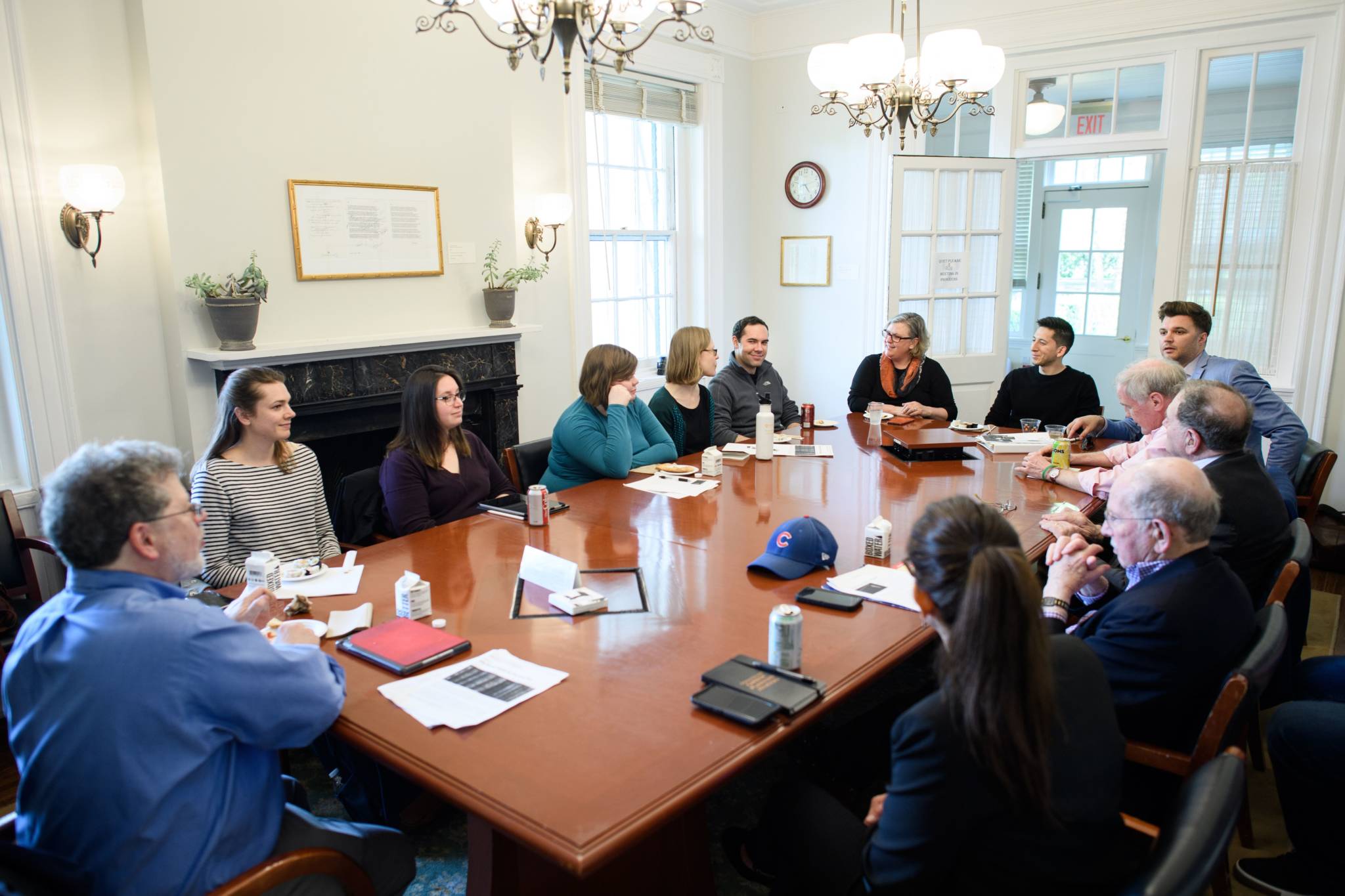
A meeting of the American Higher Ed working group at the Humanities Council in Joseph Henry House
This workshop takes a long view of American higher education, framing its problems and prospects in historical terms. After being established in the Humanities Council, the workshop in its third year is now a joint venture with the GradFutures initiative of the Graduate School. The program was offered to 15 graduate students who met every few weeks from October through early December, with two site visits, to a state college and a community college, after the winter break, followed by a final social gathering early in the spring semester.
October 1
An overview of higher education in America
October 22
The history and growth of graduate education in America, and elsewhere
November 5
International Perspectives (Europe, Asia)
November 19
Data Science and Higher Education
December 10
Professionalization
After winter break – Tenure: Past, Present, Future?, plus two site visits
Interdisciplinary Doctoral Program in the Humanities (IHUM): Graduate-Initiated Workshops
Disability Studies
Drawing on and building upon the growing interdisciplinary field from which we take our name, the Disability Studies Working Group provides an opportunity for students and faculty across the university to approach bodily difference, non-normativity, ableism, and other related concepts from a variety of lenses.
Global History of Science
The group studies the history of inquiry in regions outside Europe and the US in order to understand the universality, or lack thereof, of “science” as a concept.
Inventory
Inventory, established in 2009, is a literary translation project run by Princeton graduate students across disciplines. The group seeks to examine the art and practice of literary translation through collaborative workshops and through the publication of an annual journal. The workshop focuses on craft and provides a forum to present translations…
Post-Punk and Cultural Studies
Post-Punk and Cultural Studies listens in on the dialogue between the post-punk artistic production and cultural studies scholarship that flowered in late-1970s England. In each session we will consider exemplary texts from the respective, radical fields.
Psychoanalysis Beyond the West
This group interrogates the ability of psychoanalysis to understand non-white, non-bourgeois subjecthood. As both social theory and therapeutic practice, how has psychoanalysis been developed outside of affluent Western contexts, and to what ends? How might we account for the political and epistemological stakes of these developments?
Receptions of Latin Literature
This group examines the reception on Latin literature in European and American culture, taking a broad view of reception studies which encompasses the intellectual history, literature, and visual arts of later periods. This spring we will focus on the figure of Seneca the Younger.
Theory
Theory Reading Group is a forum for discussions of recent theoretical texts. We will focus on the issues of de/coloniality and think about contemporary politics of knowledge, power, and being.
Behrman Faculty Fellows
Princeton faculty promoted to tenure in the humanities are invited to spend two years as Behrman Fellows. The program is designed to recognize exceptional humanists as they enter the ranks of the senior faculty and to provide a forum for conversation and collaboration across disciplines. Fellows receive summer support and come together monthly for lunch-time seminars.
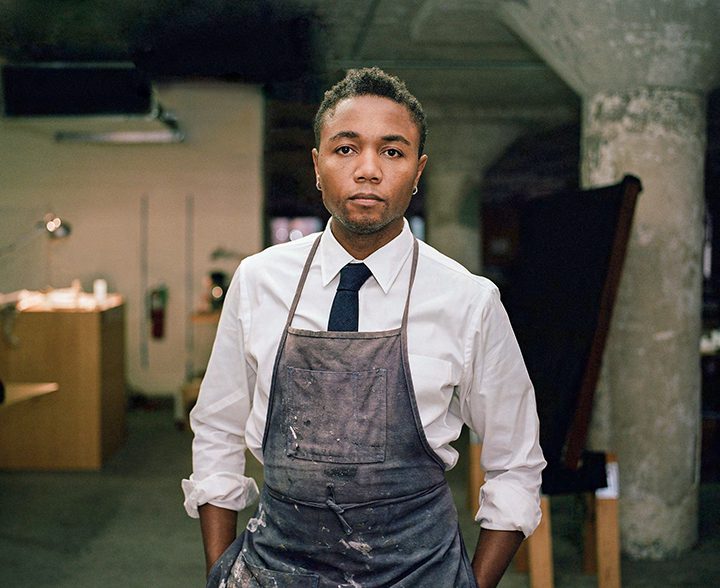
Marshall Brown is an Associate Professor of Architecture. Photo: Molly Hayes
Behrman Fellows for 2019-20
- Emmanuel Bourbouhakis, Classics
- Marshall Brown, Architecture
- Karen Emmerich, Comparative Literature
- Katja Guenther, History
- Javier Guerrero, Spanish and Portuguese
- Brian Herrera, Lewis Center for the Arts
- Paize Keulemans, East Asian Studies
- Joshua Kotin, English
- Christina Lee, Spanish and Portuguese
- Rosina Lozano, History
- Moulie Vidas, Religion
- Christy Wampole, French and Italian
- Wendy Warren, History
Behrman Fellows for 2018-19
- Lucia Allais, Architecture
- Nathan Arrington, Art and Archaeology
- Emmanuel Bourbouhakis, Classics
- Marshall Brown, Architecture
- Donnacha Dennehy, Music
- Karen Emmerich, Comparative Literature
- Javier Guerrero, Spanish and Portuguese
- Brian Herrera, Lewis Center for the Arts
- Paize Keulemans, East Asian Studies
- Joshua Kotin, English
- Federico Marcon, East Asian Studies
- Michael Meredith, Architecture
- Yair Mintzker, History
- Moulie Vidas, Religion
- Wendy Warren, History
Behrman Fellows for 2017-18
- Nathan Arrington, Art and Archaeology
- Elizabeth Davis, Anthropology
- Donnacha Dennehy, Music
- Katja Guenther, History
- Lital Levy, Comparative Literature
- Federico Marcon, East Asian Studies
- Sarah McGrath, Philosophy
- Michael Meredith, Architecture
- Teresa Shawcross, History
- Moulie Vidas, Religion
- Christy Wampole, French and Italian
Behrman Fellows for 2016-17
- Bridget Alsdorf, Art and Archaeology
- Yelena Baraz, Classics
- Wendy Belcher, Comparative Literature
- Bruno Carvalho, Spanish and Portuguese Languages and Cultures
- Lisa Davis, Anthropology
- Boris Kment, Philosophy
- Lital Levy, Comparative Literature
- Sarah McGrath, Philosophy
- Yair Mintzker, History
- Rachel Price, Spanish and Portuguese Languages and Cultures
- Sarah Rivett, English
Behrman Undergraduate Society of Fellows
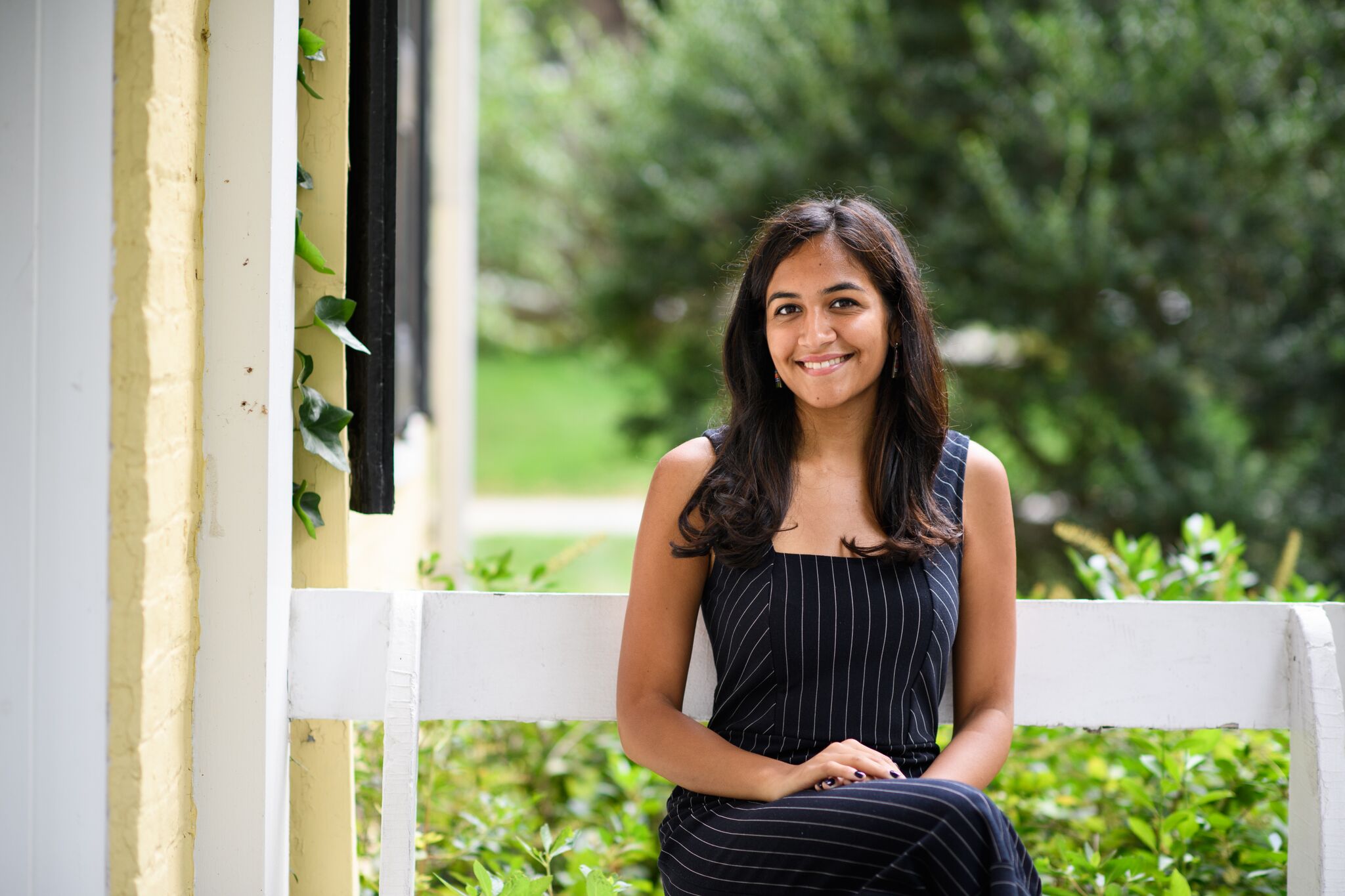
Serena Alagappan, Class of 2020
Juniors and seniors who are committed to the study of humanistic inquiry meet formally once a month during term to discuss and debate matters of common interest in the company of a few members of the faculty and distinguished guests. Additional events are scheduled throughout the year.
2019-20 Director: Yelena Baraz, Behrman Professor in the Humanities Council; Professor of Classic; Acting Director, Society of Fellows in the Liberal Arts
Associate Director: Kimberly Bain, English
Guests have included:
- President Shirley Tilghman
- Professor Bill Bialek (Physics)
- Professor Michael Cook (Near Eastern Studies)
- Professor Rubén Gallo (Spanish & Portuguese Languages and Cultures)
- Professor Bill Gleason (English)
- Professor Constanze Güthenke (Classics and Hellenic Studies)
- Professor Maria DiBattista (English and Comparative Literature)
- Professor Ann Blair (History, Harvard University)
- Professor Thomas Laqueur (History, University of California at Berkeley)




